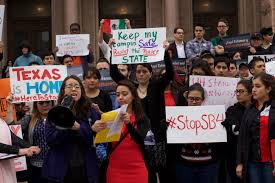 |
| Los Angeles Mayor Eric Garcetti dailynew.com |
Time once again for the latest installment of Blogger Candidate Forum, your weekly look inside Trump America. Yesterday Judge William H. Orrick sided with San Francisco and Santa Clara counties, "who argued that a threat to take away federal funds from cities that do not cooperate with some federal immigration enforcement could be unconstitutiona." (http://www.cnn.com: date accessed Apr. 26, 2017) This comes a month after a federal judge in Hawai'i issued a massive freeze on the current version of that ill-conceived ban hours before it was schedule to take effect. Needless to say POTUS tweeted his displeasure. However, what about those sanctuary cites? What are they and what are then; what should they be?
 |
| "San Francisco: A Sanctuary City" onenewsnow.com |
The term is fraught with ambiguity but has real consequences. When POTUS signed that order in January (you can read it at http://www.whitehouse.gov), he sought to punish municipalities identified by this label by holding back federal funds. San Francisco County sued. In mid-March, nearly 300 legal scholars sent a letter saying the order was unconstitutional. Ms, Misra writes, "As part of their argument, they take issue with the meaning of the phrase itself." Annie Lai, assistant clinical professor of law at the University of California, Irvine and one of the letter co-authors wrote,
There is no single definition of what it means to be a sanctuary city...The term is often used to tarnish or celebrate-depending on the speaker-that cities, counties, and states have advanced policies to separate and distinguish themselves from federal immigration authorities.
 |
| Judge William Orrick and POTUS fox5sandiego.com |
The vagueness of the term has little relevance for the legal case opposing the order: it just makes it harder to figure out which of the "300-plus so-called sanctuary jurisdictions are at risk of losing funds." Be that as it may, the divisive response to the phrase indications how loaded it has become. Opponents of immigration believe that sanctuary cities obstruct immigration enforcement and shield criminals from ICE. Immigration advocates describe them as places that opt to disentangle the local justice system from immigration enforcement-"a definition similar to that provided in the letter."
This vagueness bred confusion, to say the very least. Ms. Misra reports, "After the election, pro-Trump Bedford County, Pennsylvania, was surprised learn it was a sanctuary." County district attorney Bill Higgins told The Washington Post:
The would be be popular with the locals...That would be a quick way to get voted out of office, like signing your political death warrant.
 |
| Mayor Garcetti at a campaign rally dailynews.com |
We've never declared ourself a sanctuary city; I still not sure what one is.
Sanctuary city illicit strong reactions stemming from the Reagan-era movement, in which American congregations provided shelter to Central Americans denied asylum. In an aside Ms. Misra writes, "This 'sanctuary movement' is resurfacing today." As the wording implies, cities that fall into this category are literally sanctuaries. Or are they?
No, they are not. A 2013 report by the Migration Policy Institute a non-partisan Washington D.C,-based think tank, found, "The U.S. spends more money on immigration enforcement than on all other federal criminal law enforcement agencies combined." (http://www.migrationpolicy.org; date accessed Apr. 26, 2017) During former-President Barack Obama's administration, the budget for Immigration and Customs Enforcement grew. Thus, ICE have ample resources at their disposal to round up people, rightly or wrongly, regardless of what city they live. This is precisely what they have been doing under previous and current administration. Now, POTUS intends to triple the number of ICE officers and hire 5,000 additional border patrol agents. In order make this happen "the government is planning to loosen hiring standards, according to an internal memo obtain by Foreign Policy.
 |
| ICE agents ice.gov |
 |
| Opponents of sanctuary cities texasobserver.org |
 |
| Immigrants taking the Citizenship Oath of Allegiance in Atlanta, Georgia cnn.com |
 |
| Map of sanctuary cities apsanlaw.com |
Many of these unnecessary arrests stem from the discredited idea that a draconian crackdown on the most minor offenses-littering, sell loose cigarettes, biking on the sidewalk-will prevent more serious crimes. This model of policing, known as broken windows or zero tolerance, helped to drive mass incarceration. Its next cost could be mass deportation. (http://www.nytimes.com; date access Apr. 26, 2017)
Mijente (http://www.mijente.net), an immigrants's rights organization, has called on sympathetic mayor to expand sanctuary. They suggest reducing the penalties for minor offenses, deleting gang databases (considered inaccurate and racially biased), and giving access to legal representation to all immigrant in danger of deportation.
Back in Los Angeles, Leighton Akio Woodhous of the The Intercept reported "the mayor's office has not yet clarified whether folks with felony records would be allowed to access counsel using recently announced legal funds." (http://www.theintercept.com; date accessed Apr. 26, 2017) In the interim, Mayor Eric Garcetti's hesitancy to use the term "sanctuary city," though completely understandable, has frustrated advocates.
Hector Villager, the executive director of the Southern California American Civil Liberties Union, told Mr. Woodhouse.
I would hope that for a city as terrified as it now, that he would just say sanctuary city...That's the language people understand; that's what would give comfort at this moment.
Minus any genius practical application of the phrase "sanctuary city" this refusal is to say the words and accept its symbolism appears twice as cruel.
No comments:
Post a Comment